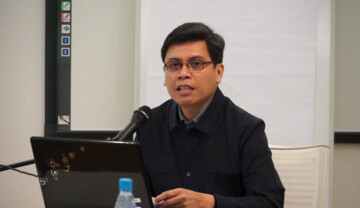The institution is foiled if it is negated and reconstructed in an alternative, which is thought to be something different from it. It is this alternative that refuses the norm and tends to harden in the course of time as the preordained opposite of the institutional. What if instead of alternative, the term “alternating” is proposed? Alternating creates the space for the “interval,” the lag between recurring shifts/currents within both acceleration and persistence. The concept harnesses the potential of the Philippine word for interval, antala, derived from Sanskrit, that means delay. It is, moreover, the root of samantala, which is simultaneously “meanwhile” and the productive use of an “opportunity” as well as the abuse of a “vulnerability.” The term “alternating” is seen in relation to the context of the “developmental” and the desire for collective action in the performative project “Stitch in Time” of David Medalla. The “developmental” references the potential of transformation in which a world “suddenly turns visible;” and the situation convened by a “stitch in time” fills the gap of alienation with the time of others, in the act of both “labor and leisure.” In the atmosphere of the alternating, the interval is key in resisting reconciliation and pursuing risk through “embodied bureaucracy” and everyday improvisation. In the climate of ubiquitous tropical decay and political corruption, the alternating instills in the agent exceptional practical intelligence so that the institutional could be lived out, outlived.


